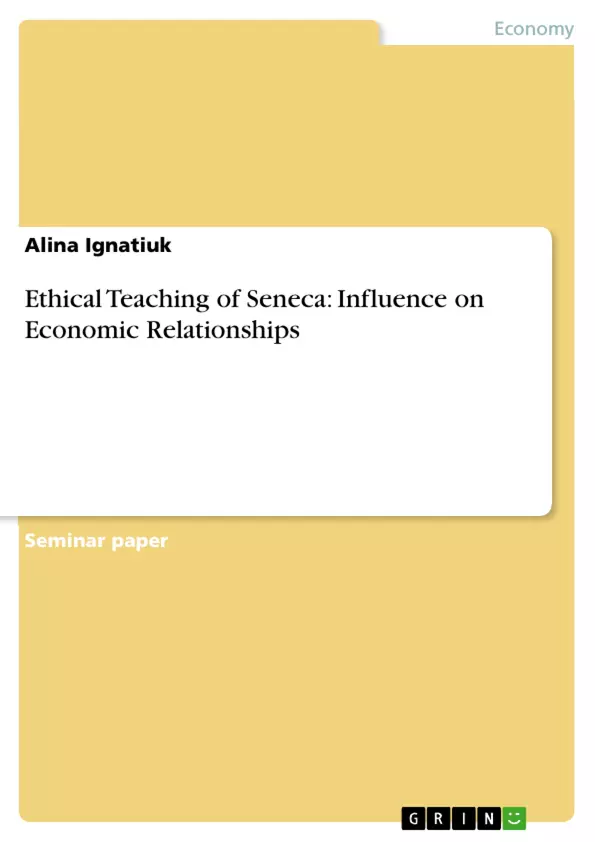“All philosophers do not say how they live.
They say how one should live”.
Seneca, On the Happy Life
Seneca does not write as a philosopher who creates or expounds a philosophical theory from the ground up and he was not a Stoic orthodox. Rather, he writes within the Stoic system that he is largely in agreement with. Seneca emphasizes his independence as a thinker and his philosophical system is an interesting and systematic combination of different philosophical views. Like other late Stoics, Seneca is first and foremost interested in ethics which will guide people in their everyday life. In this paper we will discuss Seneca’s main philosophical and ethical views which may influence economic relationships in a society.
Inhaltsverzeichnis (Table of Contents)
- Life and Works
- Stoic philosophy
- Seneca's Cosmopolitanism
- Slavery
- Money and wealth
- Nature’s law
- God, Nature and Human Being
Zielsetzung und Themenschwerpunkte (Objectives and Key Themes)
This paper examines the ethical teachings of Seneca and their potential influence on economic relationships. It explores Seneca's philosophical views within the context of Stoicism, analyzing how his ideas on cosmopolitanism, slavery, wealth, and the relationship between God, nature, and humanity could shape economic structures and societal values.
- Seneca's ethical framework within Stoicism
- The impact of Seneca's cosmopolitanism on economic interactions
- Seneca's views on slavery and their implications for economic systems
- The role of wealth and its ethical considerations in Seneca's philosophy
- Seneca's concept of natural law and its connection to economic justice
Zusammenfassung der Kapitel (Chapter Summaries)
- Life and Works: This section provides biographical information on Seneca, outlining his life under various Roman emperors and highlighting his major written works, which form the basis of the study.
- Stoic philosophy: This section introduces the core tenets of Stoicism, dividing it into its historical periods and outlining its three main branches: logic, physics, and ethics. It emphasizes the importance of virtue and the concept of "indifferent things" in achieving tranquility.
- Seneca's Cosmopolitanism: This section explores Seneca's concept of cosmopolitanism, his view of the interconnectedness of humanity, and his advocacy for a society where individuals contribute to the well-being of others. It compares Seneca’s ideal economic relationships to Adam Smith's concept of a perfect market economy.
- Slavery: This section examines Seneca's views on slavery, contrasting them with those of Aristotle. It explores Seneca's arguments for humane treatment of slaves while acknowledging the prevalence of slavery during his time.
- Money and wealth: This section analyzes Seneca's perspective on money and wealth, emphasizing the importance of a detached and rational attitude towards material possessions. It compares Seneca's views to capitalist ethics.
- Nature’s law: This section delves into Seneca's belief in living according to the laws of nature, including the acceptance of mortality and the understanding of natural events as predetermined. It discusses the philosophical implications of fatalism and its relation to human action.
- God, Nature and Human Being: This section explores Seneca's understanding of God as an intrinsic power within nature, and the potential for humans to achieve divinity through self-improvement and virtuous actions. It touches upon the interplay between human agency and divine providence.
Schlüsselwörter (Keywords)
Seneca, Stoicism, ethics, cosmopolitanism, slavery, wealth, natural law, God, nature, human nature, economic relationships, virtue, tranquility, "meditatio mortis," self-improvement, rationality.
Frequently Asked Questions
What was Seneca's approach to Stoic philosophy?
Seneca was not a Stoic orthodox; he was an independent thinker who combined different philosophical views, focusing primarily on ethics to guide people in everyday life.
How do Seneca's views on cosmopolitanism relate to modern economics?
His concept of human interconnectedness and contributing to the well-being of others is compared in the paper to Adam Smith's concept of a perfect market economy.
What did Seneca think about wealth and money?
Seneca advocated for a detached and rational attitude toward material possessions, a perspective that the paper compares to capitalist ethics.
How did Seneca view the institution of slavery?
Unlike Aristotle, Seneca argued for the humane treatment of slaves, emphasizing their shared humanity while acknowledging the social reality of his time.
What is "Nature’s law" in Seneca's teachings?
It involves living according to natural order, which includes accepting mortality (meditatio mortis) and understanding events as part of a predetermined divine or natural system.
- Quote paper
- Alina Ignatiuk (Author), 2008, Ethical Teaching of Seneca: Influence on Economic Relationships, Munich, GRIN Verlag, https://www.hausarbeiten.de/document/124461


